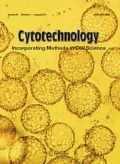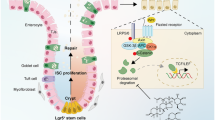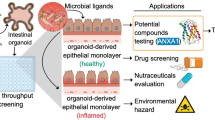Abstract
Although tumor necrosis factor-α (TNF-α) is a known major inflammatory mediator in inflammatory bowel disease (IBD) and has various effects on intestinal epithelial cell (IEC) homeostasis, the changes in IECs in the early inflammatory state induced during short-time treatment (24 h) with TNF-α remain unclear. In this study, we investigated TNF-α-induced alterations in IECs in the early inflammatory state using mouse jejunal organoids (enteroids). Of the inflammatory cytokines, i.e., TNF-α, IL-1β, IL-6, and IL-17, only TNF-α markedly increased the mRNA level of macrophage inflammatory protein 2 (MIP-2; the mouse homologue of interleukin-8), which is induced in the early stages of inflammation. TNF-α stimulation (3 h and 6 h) decreased the mRNA level of the stem cell markers leucine-rich repeat-containing G-protein-coupled receptor 5 (Lgr5) and polycomb group ring finger 4 and the progenitor cell marker prominin-1, which is also known as CD133. In addition, TNF-α treatment (24 h) decreased the number of Lgr5-positive cells and enteroid proliferation. TNF-α stimulation at 3 h and 6 h also decreased the mRNA level of chromogranin A and mucin 2, which are respective markers of enteroendocrine and goblet cells. Moreover, enteroids treated with TNF-α (24 h) not only decreased the integrity of tight junctions and cytoskeletal components but also increased intercellular permeability in an influx test with fluorescent dextran, indicating disrupted intestinal barrier function. Taken together, our findings indicate that short-time treatment with TNF-α promotes the inflammatory response and decreases intestinal stem cell activity and barrier function.

taken from b. The bar represents mean ± SE (n = 3). Different lowercase letters indicate significant differences (p < 0.05). d Time course of MIP-2 level secreted by enteroids after stimulation of 15 ng/mL TNF-α. Enteroids were cultured in enteroid culture medium with TNF-α (15 ng/mL) for 0–24 h. MIP-2 secretion was measured using ELISA. The data represents mean ± SE (n = 3). Different lowercase letters indicate significant differences (p < 0.05)





Similar content being viewed by others
Data availability
The datasets generated and analyzed during the current study are available from the corresponding author on reasonable request.
References
Ahn DH, Crawley SC, Hokari R, Kato S, Yang SC, Li JD, Kim YS (2005) TNF-alpha activates MUC2 transcription via NF-kappaB but inhibits via JNK activation. Cell Physiol Biochem 15:29–40. https://doi.org/10.1159/000083636
Atretkhany KN, Gogoleva VS, Drutskaya MS, Nedospasov SA (2020) Distinct modes of TNF signaling through its two receptors in health and disease. J Leukoc Biol 107:893–905. https://doi.org/10.1002/JLB.2MR0120-510R
Bradford EM, Ryu SH, Singh AP, Lee G, Goretsky T, Sinh P, Williams DB, Cloud AL, Gounaris E, Patel V, Lamping OF, Lynch EB, Moyer MP, De Plaen IG, Shealy DJ, Yang GY, Barrett TA (2017) Epithelial TNF receptor signaling promotes mucosal repair in inflammatory bowel disease. J Immunol 199:1886–1897. https://doi.org/10.4049/jimmunol.1601066
Braegger CP, Nicholls S, Murch SH, Stephens S, MacDonald TT (1992) Tumour necrosis factor alpha in stool as a marker of intestinal inflammation. Lancet 339:89–91. https://doi.org/10.1016/0140-6736(92)90999-j
Breese EJ, Michie CA, Nicholls SW, Murch SH, Williams CB, Domizio P, Walker-Smith JA, MacDonald TT (1994) Tumor necrosis factor alpha-producing cells in the intestinal mucosa of children with inflammatory bowel disease. Gastroenterology 106:1455–1466. https://doi.org/10.1016/0016-5085(94)90398-0
Diarra D, Stolina M, Polzer K, Zwerina J, Ominsky MS, Dwyer D, Korb A, Smolen J, Hoffmann M, Scheinecker C, van der Heide D, Landewe R, Lacey D, Richards WG, Schett G (2007) Dickkopf-1 is a master regulator of joint remodeling. Nat Med 13:156–163. https://doi.org/10.1038/nm1538
Fischer A, Gluth M, Pape UF, Wiedenmann B, Theuring F, Baumgart DC (2013) Adalimumab prevents barrier dysfunction and antagonizes distinct effects of TNF-α on tight junction proteins and signaling pathways in intestinal epithelial cells. Am J Physiol Gastrointest Liver Physiol 304:G970–G979. https://doi.org/10.1152/ajpgi.00183.2012
González-Sancho JM, Aguilera O, García JM, Pendás-Franco N, Peña C, Cal S, García de Herreros A, Bonilla F, Muñoz A (2005) The Wnt antagonist DICKKOPF-1 gene is a downstream target of beta-catenin/TCF and is downregulated in human colon cancer. Oncogene 24:1098–1103. https://doi.org/10.1038/sj.onc.1208303
Gough P, Myles IA (2020) Tumor necrosis factor receptors: pleiotropic signaling complexes and their differential effects. Front Immunol 11:585880. https://doi.org/10.3389/fimmu.2020.585880
Grabinger T, Luks L, Kostadinova F, Zimberlin C, Medema JP, Leist M, Brunner T (2014) Ex vivo culture of intestinal crypt organoids as a model system for assessing cell death induction in intestinal epithelial cells and enteropathy. Cell Death Dis 5:e1228. https://doi.org/10.1038/cddis.2014.183
Hanyu H, Yokoi Y, Nakamura K, Ayabe T, Tanaka K, Uno K, Miyajima K, Saito Y, Iwatsuki K, Shimizu M, Tadaishi M, Kobayashi-Hattori K (2020) Mycotoxin deoxynivalenol has different impacts on intestinal barrier and stem cells by its route of exposure. Toxins (Basel) 12:610. https://doi.org/10.3390/toxins12100610
Hou Q, Ye L, Liu H, Huang L, Yang Q, Turner JR, Yu Q (2018) Lactobacillus accelerates ISCs regeneration to protect the integrity of intestinal mucosa through activation of STAT3 signaling pathway induced by LPLs secretion of IL-22. Cell Death Differ 25:1657–1670. https://doi.org/10.1038/s41418-018-0070-2
Huang XL, Xu J, Zhang XH, Qiu BY, Peng L, Zhang M, Gan HT (2011) PI3K/Akt signaling pathway is involved in the pathogenesis of ulcerative colitis. Inflamm Res 60:727–734. https://doi.org/10.1007/s00011-011-0325-6
Iwashita J, Sato Y, Sugaya H, Takahashi N, Sasaki H, Abe T (2003) mRNA of MUC2 is stimulated by IL-4, IL-13 or TNF-alpha through a mitogen-activated protein kinase pathway in human colon cancer cells. Immunol Cell Biol 81:275–282. https://doi.org/10.1046/j.1440-1711.2003.t01-1-01163.x
Jones LG, Vaida A, Thompson LM, Ikuomola FI, Caamaño JH, Burkitt MD, Miyajima F, Williams JM, Campbell BJ, Pritchard DM, Duckworth CA (2019) NF-κB2 signalling in enteroids modulates enterocyte responses to secreted factors from bone marrow-derived dendritic cells. Cell Death Dis 10:896. https://doi.org/10.1038/s41419-019-2129-5
Kim MJ, Choe YH (2019) Correlation of Dickkopf-1 with inflammation in Crohn disease. Indian Pediatr 56:929–932
Li N, Sun W, Zhou X, Gong H, Chen Y, Chen D, Xiang F (2019) Dihydroartemisinin protects against dextran sulfate sodium-induced colitis in mice through inhibiting the PI3K/AKT and NF-κB signaling pathways. Biomed Res Int 2019:1415809. https://doi.org/10.1155/2019/1415809
Luissint AC, Parkos CA, Nusrat A (2016) Inflammation and the intestinal barrier: leukocyte-epithelial cell interactions, cell junction remodeling, and mucosal repair. Gastroenterology 151:616–632. https://doi.org/10.1053/j.gastro.2016.07.008
Ma TY, Iwamoto GK, Hoa NT, Akotia V, Pedram A, Boivin MA, Said HM (2004) TNF-alpha-induced increase in intestinal epithelial tight junction permeability requires NF-kappa B activation. Am J Physiol Gastrointest Liver Physiol 286:G367–G376. https://doi.org/10.1152/ajpgi.00173.2003
MacDonald TT, Hutchings P, Choy MY, Murch S, Cooke A (1990) Tumour necrosis factor-alpha and interferon-gamma production measured at the single cell level in normal and inflamed human intestine. Clin Exp Immunol 81:301–305. https://doi.org/10.1111/j.1365-2249.1990.tb03334.x
Murch SH, Lamkin VA, Savage MO, Walker-Smith JA, MacDonald TT (1991) Serum concentrations of tumour necrosis factor alpha in childhood chronic inflammatory bowel disease. Gut 32:913–917. https://doi.org/10.1136/gut.32.8.913
Niida A, Hiroko T, Kasai M, Furukawa Y, Nakamura Y, Suzuki Y, Sugano S, Akiyama T (2004) DKK1, a negative regulator of Wnt signaling, is a target of the beta-catenin/TCF pathway. Oncogene 23:8520–8526. https://doi.org/10.1038/sj.onc.1207892
Omonijo FA, Liu S, Hui Q, Zhang H, Lahaye L, Bodin JC, Gong J, Nyachoti M, Yang C (2019) Thymol improves barrier function and attenuates inflammatory responses in porcine intestinal epithelial cells during lipopolysaccharide (LPS)-induced inflammation. J Agric Food Chem 67:615–624. https://doi.org/10.1021/acs.jafc.8b05480
Onozato D, Akagawa T, Kida Y, Ogawa I, Hashita T, Iwao T, Matsunaga T (2020) Application of human induced pluripotent stem cell-derived intestinal organoids as a model of epithelial damage and fibrosis in inflammatory bowel disease. Biol Pharm Bull 43:1088–1095. https://doi.org/10.1248/bpb.b20-00088
Ozes ON, Mayo LD, Gustin JA, Pfeffer SR, Pfeffer LM, Donner DB (1999) NF-kappaB activation by tumour necrosis factor requires the Akt serine-threonine kinase. Nature 401:82–85. https://doi.org/10.1038/43466
Rossini M, Gatti D, Adami S (2013) Involvement of WNT/β-catenin signaling in the treatment of osteoporosis. Calcif Tissue Int 93:121–132. https://doi.org/10.1007/s00223-013-9749-z
Saito Y, Iwatsuki K, Hanyu H, Maruyama N, Aihara E, Tadaishi M, Shimizu M, Kobayashi-Hattori K (2017) Effect of essential amino acids on enteroids: methionine deprivation suppresses proliferation and affects differentiation in enteroid stem cells. Biochem Biophys Res Commun 488:171–176. https://doi.org/10.1016/j.bbrc.2017.05.029
Satsu H, Ishimoto Y, Nakano T, Mochizuki T, Iwanaga T, Shimizu M (2006) Induction by activated macrophage-like THP-1 cells of apoptotic and necrotic cell death in intestinal epithelial Caco-2 monolayers via tumor necrosis factor-alpha. Exp Cell Res 312:3909–3919. https://doi.org/10.1016/j.yexcr.2006.08.018
Satsu H, Hyun JS, Shin HS, Shimizu M (2009) Suppressive effect of an isoflavone fraction on tumor necrosis factor-alpha-induced interleukin-8 production in human intestinal epithelial Caco-2 cells. J Nutr Sci Vitaminol (Tokyo) 55:442–446. https://doi.org/10.3177/jnsv.55.442
Schreurs RRCE, Baumdick ME, Sagebiel AF, Kaufmann M, Mokry M, Klarenbeek PL, Schaltenberg N, Steinert FL, van Rijn JM, Drewniak A, The SML, Bakx R, Derikx JPM, de Vries N, Corpeleijn WE, Pals ST, Gagliani N, Friese MA, Middendorp S, Nieuwenhuis EES, Reinshagen K, Geijtenbeek TBH, van Goudoever JB, Bunders MJ (2019) Human fetal TNF-α-cytokine-producing CD4+ effector memory T cells promote intestinal development and mediate inflammation early in life. Immunity 50:462–476.e8. https://doi.org/10.1016/j.immuni.2018.12.010
Shimizu M (2017) Multifunctions of dietary polyphenols in the regulation of intestinal inflammation. J Food Drug Anal 25:93–99. https://doi.org/10.1016/j.jfda.2016.12.003
Sugimoto S, Sato T (2017) Establishment of 3D intestinal organoid cultures from intestinal stem cells. Methods Mol Biol 1612:97–105. https://doi.org/10.1007/978-1-4939-7021-6_7
Suzuki K, Murano T, Shimizu H, Ito G, Nakata T, Fujii S, Ishibashi F, Kawamoto A, Anzai S, Kuno R, Kuwabara K, Takahashi J, Hama M, Nagata S, Hiraguri Y, Takenaka K, Yui S, Tsuchiya K, Nakamura T, Ohtsuka K, Watanabe M, Okamoto R (2018) Single cell analysis of Crohn’s disease patient-derived small intestinal organoids reveals disease activity-dependent modification of stem cell properties. J Gastroenterol 53:1035–1047. https://doi.org/10.1007/s00535-018-1437-3
Takeda N, Jain R, LeBoeuf MR, Wang Q, Lu MM, Epstein JA (2011) Interconversion between intestinal stem cell populations in distinct niches. Science 334:1420–1424. https://doi.org/10.1126/science.1213214
Tian H, Biehs B, Warming S, Leong KG, Rangell L, Klein OD, de Sauvage FJ (2011) A reserve stem cell population in small intestine renders Lgr5-positive cells dispensable. Nature 478:255–259. https://doi.org/10.1038/nature10408
Watari A, Sakamoto Y, Hisaie K, Iwamoto K, Fueta M, Yagi K, Kondoh M (2017) Rebeccamycin attenuates TNF-α-induced intestinal epithelial barrier dysfunction by inhibiting myosin light chain kinase production. Cell Physiol Biochem 41:1924–1934. https://doi.org/10.1159/000472367
Yang S, Wang J, Brand DD, Zheng SG (2018) Role of TNF-TNF receptor 2 signal in regulatory T cells and its therapeutic implications. Front Immunol 9:784. https://doi.org/10.3389/fimmu.2018.00784
Ye X, Sun M (2017) AGR2 ameliorates tumor necrosis factor-α-induced epithelial barrier dysfunction via suppression of NF-κB p65-mediated MLCK/p-MLC pathway activation. Int J Mol Med 39:1206–1214. https://doi.org/10.3892/ijmm.2017.2928
Zhang C, Yan J, Xiao Y, Shen Y, Wang J, Ge W, Chen Y (2017) Inhibition of autophagic degradation process contributes to claudin-2 expression increase and epithelial tight junction dysfunction in TNF-α treated cell monolayers. Int J Mol Sci 18:157. https://doi.org/10.3390/ijms18010157
Zhao Z, Satsu H, Fujisawa M, Hori M, Ishimoto Y, Totsuka M, Nambu A, Kakuta S, Ozaki H, Shimizu M (2008) Attenuation by dietary taurine of dextran sulfate sodium-induced colitis in mice and of THP-1-induced damage to intestinal Caco-2 cell monolayers. Amino Acids 35:217–224. https://doi.org/10.1007/s00726-007-0562-8
Acknowledgements
We express our gratitude to Dr. Hans Clevers (Hubrecht Institute) for the kind gift of the Noggin-secreting cell line, Dr. Eitaro Aihara (Cincinnati University) for kindly donating the R-spondin-secreting cell line, and Dr. Tokiyoshi Ayabe (Hokkaido University) for the kind gift of anti-lysozyme antibody.
Funding
This work was supported by Japan Society for the Promotion of Science (JSPS) Grant-in-Aid for JSPS fellows Grant Number JP18J22466.
Author information
Authors and Affiliations
Contributions
YS, MS, KI, MT, YSK, and KKH designed the experiments. YS and HH performed the experiments. YS, MS, and KKH wrote the paper.
Corresponding author
Ethics declarations
Conflict of interest
The authors have no conflicts of interest to disclose.
Ethical approval
Animal experiments were conducted in accordance with the guidelines for the maintenance and handling of experimental animals established by the Tokyo University of Agriculture Ethics Committee (Approval No: No. 2020037).
Additional information
Publisher's Note
Springer Nature remains neutral with regard to jurisdictional claims in published maps and institutional affiliations.
Supplementary Information
Below is the link to the electronic supplementary material.
Rights and permissions
About this article
Cite this article
Saito, Y., Shimizu, M., Iwatsuki, K. et al. Effect of short-time treatment with TNF-α on stem cell activity and barrier function in enteroids. Cytotechnology 73, 669–682 (2021). https://doi.org/10.1007/s10616-021-00487-y
Received:
Accepted:
Published:
Issue Date:
DOI: https://doi.org/10.1007/s10616-021-00487-y




